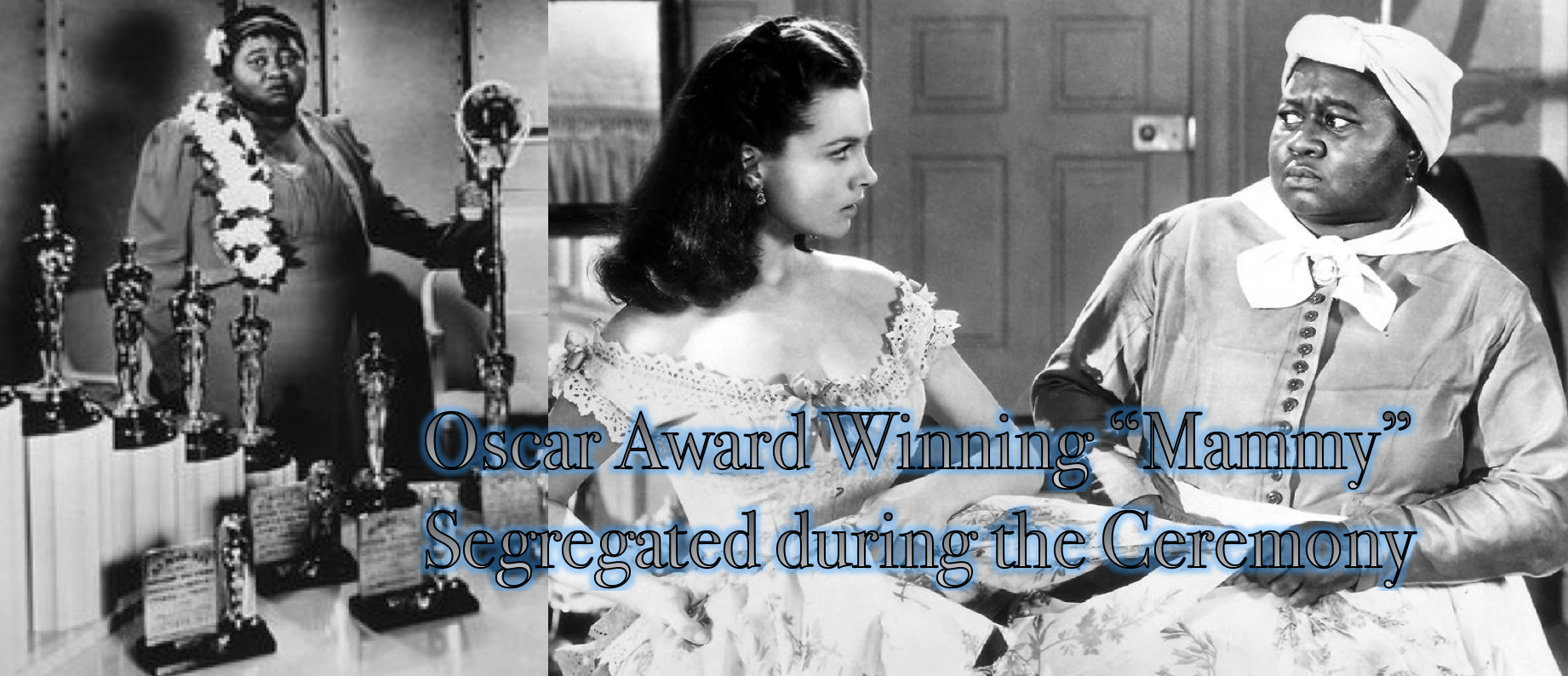Hattie McDaniel was the first black person to win an Oscar in 1940 for her role as Mammy in Gone with the Wind, she accepted the award in tears as ‘a credit to her race’ during the segregation era. Although she was an Oscar award winner segregation laws forced her to sit away from her co-stars at a remote table in the hotel where the ceremony was held. The hotel did not even have an entrance for Blacks, despite initial backlash, she was allowed to receive her Oscar but she was kept segregated throughout the ceremony. Her award winning role as a house servant was the highlight of her career, but her time at the Oscars was not a first in battling segregation to enjoy the fruits of her labor for the film. In 1939, all of the film’s black actors were barred from attending the premier when it aired at the Loew’s Grand Theatre in Atlanta Georgia.
Actress Hattie McDaniel was born in Wichita, Kansas on June 10, 1893 to her father Henry McDaniel, a Civil War veteran and mother Susan Holbert. She was the youngest of thirteen children in a family of performers. Her father, along with being a war veteran, was a Baptist minister, carpenter, banjo player, and minstrel showman. Her father married Susan Holbert, a gospel singer at the time, in 1875. They used their combined entertainment experience to organize the family into a minstrel troupe, where they performed songs whose lyrics told imaginary stories of distant places and historical events.
Hattie’s mother also worked as a domestic worker, a role that she’d perfected and played with wit and charm on screen. McDaniel played a domestic worker in 74 of the 94 roles she had. Although she’s popularly known for her acting on screen, she began her entertainment career in the 1925 as one of the first Black women to perform on the radio on Denver’s KOA station. She got her first role on television in 1934 on the film Judge Priest singing a duet with Will Rogers. From that she continued to get more onscreen roles. The following year in 1935 she landed a role as Mom Beck in The Little Colonel starring opposite Shirley Temple and Lionel Barrymore. In 1936 she got the part of Queen in the film adaptation of Showboat with Irene Dunne.



Although McDaniel was a well known celebrity of her time, she was not always accepted by her audiences. Black media criticized her for playing servants and slaves. Throughout the 1940s, during Walter Whites presidency of the NAACP he urged black actors to stop accepting domestic and offensive roles, singling out Hattie McDaniel’s career choice as the national on screen ‘Mammy’ as particularly offensive. He pleaded with filmmakers to portray blacks as ‘capable of achieving far more than cooking and cleaning for white people’.
In 1947 she began starring on CBS radio’s The Beulah Show, the show revolved around the life of a Black maid and the white family for whom she worked. With this role she became America’s first black performer to star in a radio program intended for a general audience. Because of the program’s historic accomplishment it was praised by organizations such as the Urban League, along with the twenty million other Americans who listened to it every evening. The Beulah Show reached the height of its popularity in 1950.
Although McDaniel was criticized for her choice of on screen roles, its important to understand that the roles she played were not strictly her choice. Even today Black actors are portrayed as the street thug, rarely in a positive professional light and even Black women on screen fall prey to men as a desperate a sex fiend, broken for male attention, regardless of how successful she seems in her career. It was just this weekend that Black Panther, a movie of historical achievement with an all black starring cast directed by Ryan Coogler, an African American director, was released. Sadly, we must remember that there were absolutely no Black directors during McDaniel’s time, and white directors were not interested in portraying blacks in humanizing roles. McDaniel was an incredible actress, she opened doors for Oscar winners like Whoopie Goldberg (1991) and Viola Davis (2017) who later acted in roles that did more to humanize black women. Hattie did what she could with the resources she had in her time, which is all we can ever do. She was a trailblazer and a pioneer.

